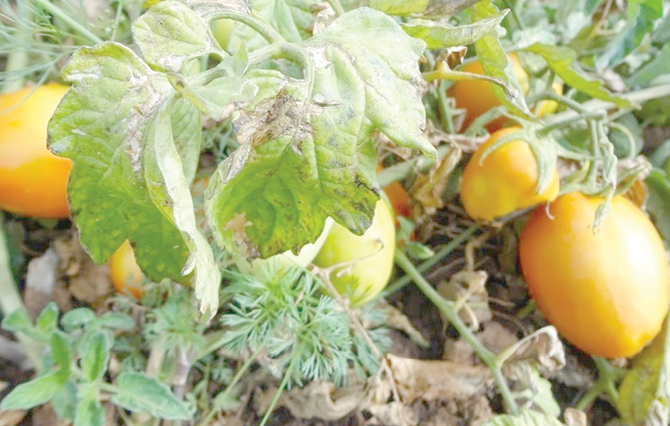Tomato farmers lost 300 hectares worth N1.3bn to Tuta Absoluta
The recent outbreak of tomato disease has destroyed huge investments worth billions of naira in Kano, Kaduna, Katsina and Gombe states. On Tuesday, the Federal Government, Nigeria Agribusiness Group (NABG), Hort Nigeria, Nigerian Horticultural Research Institute (NIHORT), Sygenta, International Institute of Tropical Agriculture (IITA) and others met in Abuja to intensify effort in combatting Tuta […]

A tomato farm infested with Tuta absoluta
The recent outbreak of tomato disease has destroyed huge investments worth billions of naira in Kano, Kaduna, Katsina and Gombe states.
On Tuesday, the Federal Government, Nigeria Agribusiness Group (NABG), Hort Nigeria, Nigerian Horticultural Research Institute (NIHORT), Sygenta, International Institute of Tropical Agriculture (IITA) and others met in Abuja to intensify effort in combatting Tuta Absoluta, also known as Tomato Ebola currently ravaging tomato farms in some parts of the country.
The Director Horticulture, Federal Ministry of Agriculture and Rural Development, Dr Deola Lordbanjoce, explained that “This current crisis with Tuta Absoluta started from Galama Local Government Area of Kano State. When it was reported, we started our investigation and we found out that about 300 hectares in that local government alone were affected by this infestation.
“And from our end, we need to look into the economics of what we are talking about. Then, we got to know that the farmers in that local government arising from the infestation of Tuta Absoluta may have lost about N1.3 billion,” he said.
- 10th NASS: N/Central govs back Sani Musa for dep Senate President
- Why NAHCON must review 2023 Hajj airlift plan – CSO
The director said the ministry was working in collaboration with the National Tomato Growers, Processors and Marketers Association of Nigeria every time and investigating what is happening in other states.
Alhaji Sani Danladi, Secretary-General of the National Tomato Growers, Processors and Marketers Association of Nigeria, bemoaned the enormous loss that more than 500 farmers in Kano have suffered, while it is unknown how many farmers in the states of Katsina, Jigawa, Kaduna, and Gombe have been impacted.
“This year, more than 300 hectares have been destroyed by this disease which affected more than 500 farmers in Kano State, and also affected farmers in Kaduna, Katsina, Jigawa and Gombe states. We are still collecting data from the remaining states, and that is why tomato is very scarce now.
“Ninety per cent of tomato in Kano has gone because of Tuta Absoluta devastation. This one is different from caterpillars; it is very devastating as you can’t eat it.”
Dr Mohammad Attanda, the Executive Director and Chief Executive Officer of NIHORT, who was represented by Oladigbolu Abiola, Head of the NIHORT Biopesticide Center, recalled that in 2015, the pest caused enormous destruction and disruption of the tomato value chain, and the sole reliance on synthetic insecticides for the control of Tuta Absoluta had led to the development of resistance—a change in the sensitivity of the Tuta population to synthetic pesticides.
However, among the suggestions made by the NIHORT CEO are the following: Farmers should work to adopt the planting of NIHORT’s three recently released tomato seeds bred for high yield, tolerance to fusarium, good shelf life, and nutrition qualities. The Federal Ministry of Agriculture and Rural Development should incorporate NIHORT sustainable Tuta Integrated Management Package for tomato production in the national tomato policy to stem the tide of this occurrence.
The NABG President, Emmanuel Ijewere, stated during the meeting that all stakeholders had decided to wage total “war” on the invading insects.
Ijewere drew attention to the worrying development and stated that it cannot be left to the farmers alone. His organization is setting up a stakeholders’ meeting to address the issue because, in the sense that they have made significant investments in their farms for tomato production, farmers—not even processors—are the ones who suffer the most.
